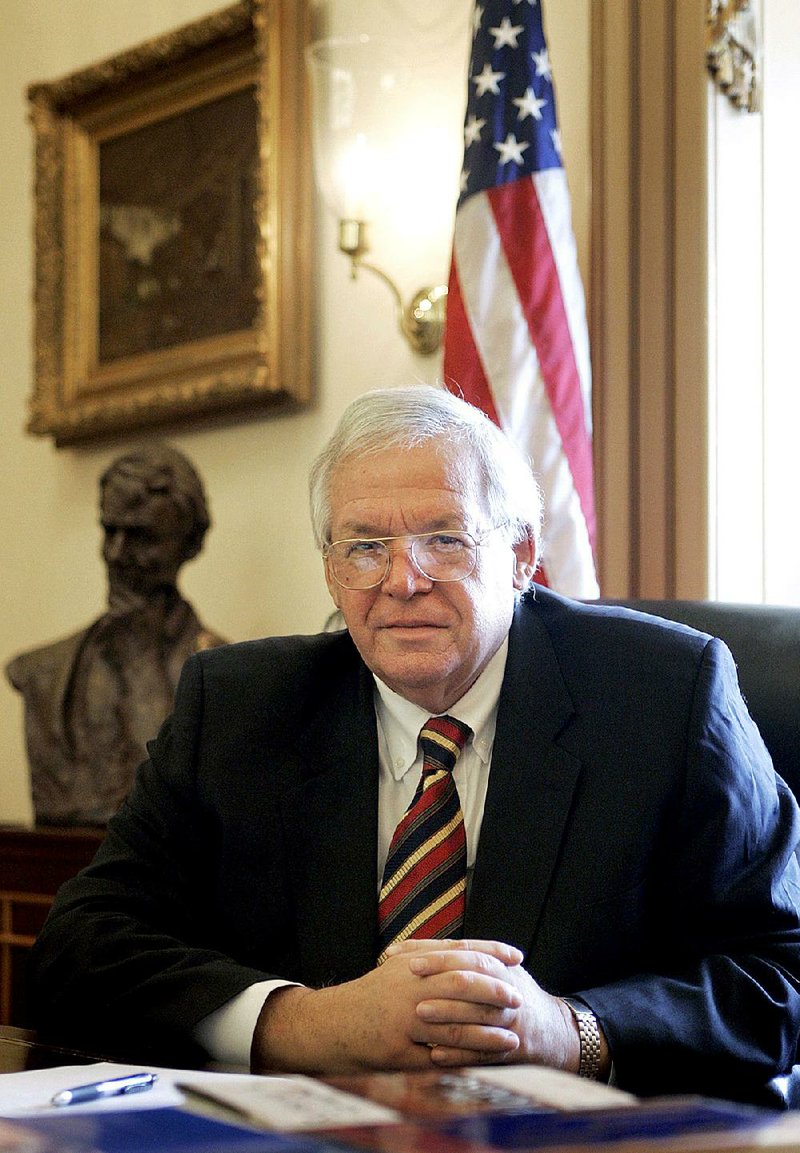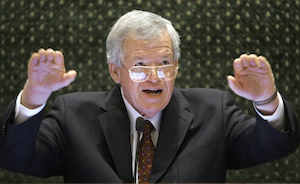CHICAGO -- Dennis Hastert, the former U.S. House speaker, was indicted by a federal grand jury on charges that he evaded currency-reporting requirements and lied to the FBI as part of a hush-money scheme.
Hastert, 73, withdrew $952,000 in small increments to avoid a requirement that banks report cash transactions exceeding $10,000, the U.S. Justice Department said Thursday. The withdrawals were part of a plan to give a person who was not named $3.5 million as a payoff to conceal "prior misconduct," Chicago U.S. Attorney Zachary Fardon said in a statement.
The seven-page indictment does not describe the misconduct Hastert was reportedly trying to conceal.
Hastert, a Republican from Plano, Ill., served in the House of Representatives from 1987 to 2007. He became the chamber's speaker in 1999.
Starting in July 2012, Hastert began structuring the small withdrawals, prosecutors said. Later, when questioned by agents of the FBI, he told them that he was keeping the cash, they said.
Since 2008, Hastert has been a senior adviser at Dickstein Shapiro LLP in Washington, where he's a registered lobbyist. A woman answering the phone at the firm said Hastert wasn't available for comment. Hastert didn't immediately respond to an emailed request for comment. Kimberly Nerheim, a spokesman for Fardon, said information on Hastert's lawyer wasn't immediately available.
Hastert is charged with one count of evading bank regulations and one count of lying to the FBI. Each of the charges against Hastert carries a maximum sentence of five years in prison and a $250,000 fine.
Before his political career, Hastert had been a high school teacher in Yorkville, Ill., about 50 miles west of Chicago, where a person identified in the indictment only as "Individual A" also lived. That person had known Hastert most of his life, according to the indictment.
In 2010, Individual A met with Hastert several times and, in at least one of those meetings, discussed the alleged "past misconduct" that had occurred years earlier. Hastert agreed to pay that person $3.5 million "to compensate for and conceal" the misconduct, according to the indictment.
From 2010-14, Hastert withdrew about $1.7 million from various bank accounts. During the first two years, he took $50,000 from accounts at three banks, paying money to Individual A about every six weeks.
After being questioned about those withdrawals by bank representatives, Hastert started making them in increments of less than $10,000, paying the money in $50,000 bundles "at pre-arranged meeting places and times," according to the indictment.
Last year, Hastert and Individual A changed their payment pattern to $100,000 every three months. Hastert continued making the under-$10,000 withdrawals.
By that time, the FBI already had started an investigation, the focus of which involved whether Hastert, in the words of the indictment, was "the victim of a criminal extortion related to, among other matters, his prior positions in government." The indictment does not elaborate.
Investigators questioned Hastert on Dec. 8, and, according to the indictment, he lied about why he had been withdrawing so much money at a time. He told investigators that he did it because he didn't trust the banking system, the indictment says.
"Yeah ... I kept the cash. That's what I am doing," it quotes Hastert as saying.
Also Thursday, Hastert resigned from the board of CME Group Inc., the Chicago-based futures exchange operator, where he'd served since 2008, most recently as a member of its compensation committee, spokesman Anita Liskey said.
On his final financial-disclosure form in 2007, Hastert reported having assets, mostly farmland, totaling from $3.1 million to $15.3 million. He also reported having a mortgage against his home and land of $1 million to $5 million.
Hastert reported that he had received $34,000 in an Illinois state pension. He also would have started receiving a congressional pension after retiring.
Current lobbying reports don't provide enough information to tell how much Hastert is paid by the Dickstein Shapiro firm.
The case is U.S. v. Hastert in U.S. District Court, Northern District of Illinois (Chicago).
Information for this article was contributed by Andrew Harris, Richard Rubin, Matthew Leising and Billy House of Bloomberg News and by Michael Tarm and staff members of The Associated Press.
A Section on 05/29/2015


